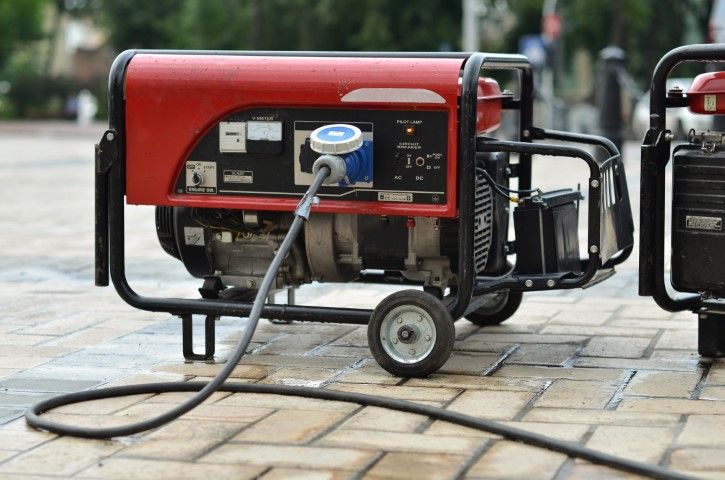Portable Generators in Chesapeake VA
A portable generator is a compact, self-contained power source designed to be moved easily. It converts mechanical energy into electrical energy, allowing you to power appliances, tools, and other devices when regular electricity isn't available. Most portable generators use an internal combustion engine to produce electrical power, which is then delivered through standard outlets or special connections.
Types of Portable Generators
Portable generators come in several types, each suited for different needs:
- Inverter Generators: Known for their quiet operation and clean power output, inverter generators are ideal for sensitive electronics like laptops and smartphones. They adjust their engine speed to match the load, improving fuel efficiency and reducing noise.
- Conventional Generators: These are the most common type and offer robust power output at a lower cost. They are suitable for powering home appliances and tools but tend to be louder and less fuel-efficient compared to inverter models.
- Dual-Fuel Generators: As the name suggests, these generators can operate on either gasoline or propane. This flexibility allows you to choose your preferred fuel source based on availability and cost.
- Portable Solar Generators: Utilizing solar panels, these generators convert sunlight into electrical energy. They are an eco-friendly option and are especially useful for off-grid locations.
Key Features to Consider
When selecting a portable generator, consider the following features to ensure it meets your needs:
- Power Output: Measured in watts, this determines the amount of power the generator can provide. Ensure the generator's wattage matches or exceeds the total wattage required by your appliances or tools.
- Run Time: This indicates how long the generator can run on a full tank of fuel. Longer run times are beneficial for extended outages or extended outdoor activities.
- Portability: Look for generators with handles, wheels, or a compact design if you need to move it frequently.
- Noise Level: If noise is a concern, especially for residential use or camping, choose a generator with a lower decibel rating.
- Safety Features: Automatic shut-off, low-oil shutdown, and overload protection are crucial for safe operation.
Regular Inspection and Maintenance
To keep your portable generator in good working condition, regular inspection and maintenance are essential:
- Check Oil Levels: Regularly check and change the oil according to the manufacturer's recommendations. This helps keep the engine running smoothly.
- Inspect the Air Filter: Clean or replace the air filter to ensure proper airflow and prevent engine damage.
- Examine the Spark Plug: Inspect and replace the spark plug as needed to ensure reliable starting and efficient operation.
- Test the Generator: Run the generator periodically to ensure it operates correctly and to prevent issues from arising during critical times.

Fuel Management and Storage
Proper fuel management and storage are vital for safe and efficient generator operation:
- Store Fuel Properly: Keep fuel in a well-ventilated area away from direct sunlight and sources of ignition. Use approved containers and follow local regulations for fuel storage.
- Use Stabilizers: Add fuel stabilizers to extend the shelf life of gasoline and prevent degradation. This helps avoid engine problems caused by old or stale fuel.
- Handle Fuel Safely: Always turn off the generator and allow it to cool before refueling. Avoid overfilling and clean up any spills immediately.
Winterizing Your Generator
Winterizing your generator is crucial to ensure it starts and runs smoothly in cold weather:
- Store Indoors: If possible, keep the generator in a dry, heated area during winter months to prevent freezing of the fuel and oil.
- Use Winter Fuel: Switch to winter-grade fuel to prevent fuel from gelling in low temperatures.
Check Battery: If your generator has a battery, keep it charged and consider using a battery maintainer.etween refueling.
Fuel Efficiency and Duration
Fuel efficiency and duration are important factors when choosing a generator:
- Efficiency: Inverter generators are generally more fuel-efficient than conventional models due to their ability to adjust engine speed based on the load.
- Duration: Look for generators with larger fuel tanks or advanced fuel management systems if you need longer runtimes between refueling.
Choosing the right portable generator for your needs can make a significant difference in your preparedness and convenience. If you have any questions or need assistance in selecting or maintaining your portable generator in Chesapeake, VA, feel free to contact us. Our knowledgeable team is here to help you find the perfect solution for your power needs.
Call us today to learn more about our range of portable generators and services. We're committed to providing you with the best products and support to keep you powered up, no matter the situation.
Popular Ways to Use Portable Generators
Portable generators are versatile tools that provide a reliable source of power in various situations. Whether for emergencies or everyday tasks, they offer a convenient solution when electricity is not available. Understanding their common uses can help you maximize their benefits and ensure you're prepared for different scenarios.
Emergency Backup Power
One of the most critical uses of portable generators is providing backup power during outages. When the electricity goes out due to storms, accidents, or other disruptions, a portable generator can keep essential appliances running. This includes refrigerators, medical equipment, and heating or cooling systems, which are crucial for maintaining comfort and safety in your home.
Outdoor Activities and Events
Portable generators are ideal for outdoor activities such as camping, tailgating, and picnics. They allow you to power lights, small appliances, and entertainment devices, enhancing your experience away from home. Whether you're hosting a barbecue or enjoying a camping trip, a portable generator ensures you have the power you need.
Construction Sites
In construction, a reliable power source is essential for operating tools and equipment. Portable generators provide the necessary power to run saws, drills, and other machinery on sites without access to electricity. This flexibility makes them a valuable asset for construction projects, enabling work to continue smoothly and efficiently.
Remote Locations
For those who work or live in remote locations, portable generators can be a lifeline. They supply power to homes or workspaces where traditional electricity sources are unavailable. This is particularly useful for cabins, workshops, or any location far from the main power grid.
Emergency Preparedness
Portable generators are a crucial component of emergency preparedness plans. They ensure you have a reliable power source in situations where access to electricity is compromised. This can include natural disasters like hurricanes or floods, where having backup power can be essential for staying connected and safe.
Special Events
For special events like weddings, outdoor festivals, or large gatherings, portable generators can provide the necessary power for lighting, sound systems, and other equipment. They help ensure that events run smoothly and that all electrical needs are met, regardless of the location.
If you're interested in learning more about portable generators and how they can meet your specific needs, don't hesitate to reach out. Our team is here to answer your questions and help you find the right generator for your requirements. Contact us today to explore your options and ensure you're prepared for any situation.
Environmental and Safety Considerations of Portable Generators
Portable generators provide a convenient power source during outages or in locations without a steady electrical supply. They are invaluable in many situations, from powering a home during an emergency to supporting a construction site. However, while portable generators offer many benefits, they also present environmental and safety challenges that must be carefully managed. Understanding these issues is essential for responsible use.

Emissions and Air Quality
Portable generators run on gasoline or diesel, which means they emit exhaust gases that can impact air quality. These emissions include carbon monoxide, nitrogen oxides, and particulate matter, which can contribute to air pollution. Prolonged exposure to these pollutants can have adverse health effects, particularly for those with respiratory conditions. It is crucial to use generators in well-ventilated areas to minimize these risks and to consider alternative power sources, like solar or wind, which have a lower environmental impact.
Fuel Storage and Spills
Fueling a generator involves handling gasoline or diesel, which are flammable and hazardous materials. Improper storage of fuel can lead to spills, creating fire hazards and environmental contamination. It’s important to store fuel in approved containers, away from living areas, and to follow local regulations regarding fuel storage. In the event of a spill, it should be cleaned up immediately according to safety guidelines to prevent harm to the environment.
Noise Pollution
Generators can be quite noisy, producing sound levels that may exceed 70 decibels. This noise can disturb neighbors and wildlife, especially in quiet or residential areas. To address this issue, consider placing the generator on a sound-absorbing surface or using sound-dampening materials. Additionally, choosing a generator with a lower noise rating can help reduce its impact on the surrounding environment.
Safety Precautions
The use of portable generators requires strict adherence to safety protocols to prevent accidents. Key safety considerations include:
Carbon Monoxide Poisoning
Generators produce carbon monoxide, a colorless and odorless gas that can be deadly in high concentrations. Always operate generators outdoors and away from windows, doors, and vents to ensure proper ventilation. Installing a carbon monoxide detector in areas where the generator is used can provide an added layer of safety.
Electrical Safety
Improper use of electrical cords and connections can lead to shocks or fires. Ensure all connections are secure and that cords are in good condition. Use extension cords rated for outdoor use and avoid running them through water or across areas where they could be damaged.
Fire Hazards
Generators should be kept away from flammable materials and used on stable, non-combustible surfaces. Regular maintenance, including checking for fuel leaks and ensuring the generator is in good working order, helps reduce the risk of fire.
Proper Maintenance
Routine maintenance of your generator is essential for safe and efficient operation. Follow the manufacturer’s guidelines for servicing, including checking oil levels, cleaning air filters, and inspecting the fuel system. Regular maintenance not only extends the life of the generator but also ensures it operates safely and efficiently.
Ensuring the safe and environmentally responsible use of portable generators is key to maximizing their benefits while minimizing potential risks. If you have questions about the environmental and safety considerations of portable generators or need assistance with proper usage and maintenance, contact us today. Our team of experts is here to provide guidance and support to help you use your generator safely and effectively. Feel free to reach out to us for more information or to schedule a consultation.
